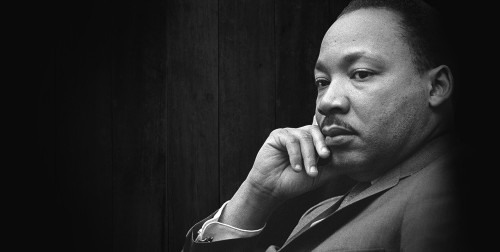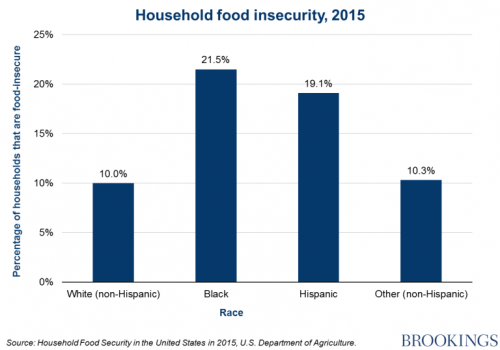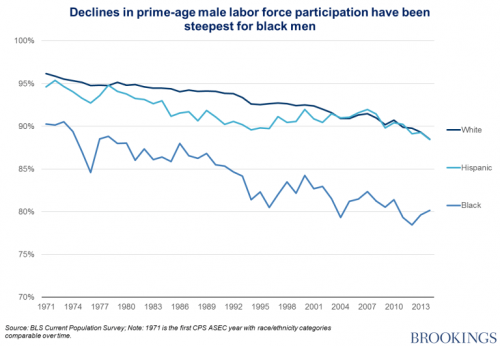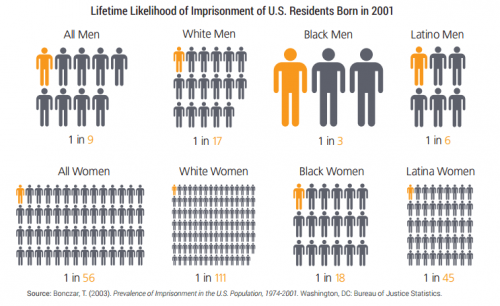Today is Martin Luther King, Jr. Day in the United States. It’s a national holiday (what Europeans refer to as a “bank holiday”) and as such schools, federal and state offices, and (yes) banks are closed.

Today, you’ll find countless posts on the life of MLK, Jr. and stories of the struggles he faced in his pursuit of non-violent opposition to hatred, bigotry, and racism. The Civil Rights Movement, as it came to be called here, of the 1950s and early 60s, has become synonymous with the name of Martin Luther King, Jr.
I’ll not repeat those stories. Instead, I want to leave you with three quotes of his that have stayed with me over the years, quotes that I hope will speak to you too as we enter this new, very strange time in our country. And, I’m interspersing three quotes with charts I recently saw from the Brookings Institute. They are self-explanatory.

1. From a Speech to his staff, 1966:
You can’t talk about ending the slums without first saying profit must be taken out of slums. You’re really tampering and getting on dangerous ground because you are messing with folk then. You are messing with captains of industry. Now this means that we are treading in difficult water, because it really means that we are saying that something is wrong with capitalism… Call it what you may, call it democracy, or call it democratic socialism, but there must be a better distribution of wealth within this country for all of God’s children.There must be a better distribution of wealth and maybe America must move toward a democratic socialism.”

2. From a Speech to the Southern Christian Leadership Conference in Atlanta, Georgia, August 16, 1967:
And one day we must ask the question, ‘Why are there forty million poor people in America?’ And when you begin to ask that question, you are raising questions about the economic system, about a broader distribution of wealth. When you ask that question, you begin to question the capitalistic economy. And I’m simply saying that more and more, we’ve got to begin to ask questions about the whole society… Capitalism forgets that life is social. And the kingdom of brotherhood is found neither in the thesis of communism nor the antithesis of capitalism, but in a higher synthesis.”

3. From a Speech at Bishop Charles Mason Temple of the Church of God in Christ in support of the Memphis sanitation workers’ strike March 18, 1968, two weeks before he was assassinated:
If America does not use her vast resources of wealth to end poverty and make it possible for all of God’s children to have the basic necessities of life, she too will go to hell.

How about you? How will you remember Martin Luther King, Jr. this year?
[box] Interested in reading At Home on the Kazakh Steppe? I hope so.
Click here for the PAPERBACK and eBook versions.
Amazon makes it easy. And, you can always order it from your local independent bookstore.
Reviews are more important to authors today than ever before. If you’ve read it and enjoyed it, please consider leaving a review on Amazon or Goodreads. Short reviews are just as valuable as long ones. [/box]
Next:
January 18: Staying (Getting?) Involved, a post in anticipation of Friday’s inauguration
January 25: The Women’s March on Washington, my personal reflections
February 1: My Proposed Mission Statement, what I’ve learned from the survey monkey questionnaire you filled out for me. One more week for you to hop over and add your thoughts. You needn’t be a subscriber or a blogger to give me your thoughts.
February 8: My first guest post for 2017. “What I learned learnt about …” (You’ll just have to drop by and read for yourself).
Lydia
This was such an interesting post.
I wonder what Martin Luther King, Jr. would have to say about life in 2017? Some things have changed a lot since his death, but like your post shows some things haven’t changed at all.
Janet Givens
Hello Lydia and welcome. Thank you for starting us off today. Certainly not enough has changed, though I do think more of us now see the institutionalized racism that pervades our society. And greed now seems elevated to a virtue. I’m reminded of an old Tshirt I saw back in the Reagan era: “The one with the most money when he dies, wins.” It’s sad, truly. We are living in precarious times.
I just visited your own website this morning and see you have also taken a “cultural differences” look at life in Canada vs the US. I have family in Canada and I can certainly relate.
Thanks for joining us here. I look forward to future exchanges with you.
Lydia
You’re welcome, Janet. Thank you for your warm greeting. I agree that more people are aware of institutional racism (and prejudice in general) than they were fifty years ago.
I didn’t know you had family members who lived in Canada! How neat.
I will definitely be sticking around here. This seems like such a nice site.
Janet Givens
Yes, my husband’s brother and niece’s family live outside of Ottawa. I’m always surprised that they have a longer growing season than we do here in northern Vermont.
Thank you for the compliment. My readers make the site what it is. And you will make a great addition. Thanks again.
Marian Beaman
Last evening I listened to Steve Kroft’s final interview with President Obama on Sixty Minutes. The interview, a retrospective, showcased Obama’s insights about his 8 years in office.
When Steve asked Obama about significant objects in the Oval Office, the camera lighted up the bust of Martin Luther King about whom the President made a comment about his hope for solidarity. His advice to the incoming administration: to make sure “certain norms, certain institutions and traditions don’t get eroded.” We shall see. Here’s the link: http://www.cbsnews.com/60-minutes/
I’m proud of you – you always do your homework and brighten up the text with visuals to help the message stick. Brava!
Janet Givens
Thanks Marian. I saw the interview, too. But thanks for posting the link for those who haven’t. More on Wednesday, you know.
Susan Jackson
Yep, #2 and 3 are definitely what I consider serious problems
Merril Smith
Thanks for your interesting post, Janet. I think you are correct that many people think about MLK only in terms of civil rights–getting the right to vote and such–but do not really think about the economics of every day life.
I’m afraid many people are going to be more aware of this–if the Affordable Care Act is demolished, many people will not be able to afford health care. And let’s hope all sorts of other gains do not disappear as well.
Janet Givens
It’s a strange time. I like the quote Marian posted recently to Facebook. Something about how great change always come out of chaos. I feel very fortunate, privileged really, that most of the changes we will surely see will not affect me much at this point in my life. Except, of course, for nuclear and environmental catastrophes. I march, I fight for my grandchildren and the world they will inherit.
Kathleen Pooler
Janet, I appreciate the depth of research you provide. Your post serves as a reminder of a truly great man. While poverty, racism and economic disparities still exist, Dr King planted a seed for us all to keep fighting and hoping for the “dream”. In these uncertain times, his voice and message still resonate, giving us all pause to reflect and do our part to combat despair. Thanks to Marian for the Sixty Minute link. I usually watch it but missed it this week. I need some fortification for the week ( 4 years) ahead.
Janet Givens
Thank you, Kathy. My hope is that we all find the fortification we will need for these coming years. I know I have to remind myself to stay healthy: Enough rest, good food, hydrate, meditate, exercise, etc. That’s first. Then, I have set up those monthly contributions to organizations that I know will help keep me vigilant. Third, I must stay informed; that’s sometimes where the exhaustion comes in. Slogging though the morass; I wish it were easier, without limiting me to just those presses that I already agree with.
Then, as my next post will talk about, Staying (Getting) Involved — for now, just a simple process of identifying and contacting our legislators. Just opening the door, taking their pulse (that of their staff more likely), getting our name before them. I’ve got it a bit easier than most because I live in Vermont (Bernie land). But it’s an important step, even when they agree with us. Anyway, I’m chattering away.
Thanks for joining us today.
Ian Mathie
It strikes me that very little has changed since MLK Jr said those things. The only difference is the problem is now seven times bigger, like the population, and the hatred is more entrenched than ever.
Two key elements are lacking in society today: tolerance and caring about others. Find those and society could have a bright future.
Terri Lyon
Interesting charts and quotes, Janet. I heard someone speak yesterday about Bayard Rustin, a less-known but extremely influential civil rights activist. I am in awe of their bravery.
Janet Givens
Thank you Terri, and welcome to And So It Goes. I didn’t hear the piece on Bayard Rustin, but he was certainly a vital force during that era. A great organizer and behind the scenes powerhouse. He didn’t seek fame or even recognition, and as I think about it, personified the importance of seeing these various struggles for justice — civil, economic, gay and others — as having one source, in his own words, “the failure of society to meet human needs.”
Janet Givens recently posted…My 2019 Sugar Resolution — Part II
Terri Lyon
In my research on activism, I found there is a huge need for leaders to run the organizations and lead staff and volunteers. Leaders like Bayard Rustin.
This ‘activism’ frees others to use their strengths for their cause. How sad that lack of leadership shelves justice initiatives.
Janet Givens
And where is leadership taught again, Terri? Or at least nurtured? Real leadership, statesmanship, has become very hard to find. Greed, every man for himself (literally), winner take all, etc. have become the goals. BUT, not everywhere. I have hope. Sometimes people have to hurt enough to stand up. And get egos out of the way. It can get complicated. Thanks; keep adding your voice here. And do be sure to click that CommentLuv button so we can see the link to your well-done blog.
Janet Givens recently posted…What I’ve Learned From The Word Press Wars
Marian Wood
Hi, interesting read. I know very little about Martin Luther King junior so I have learnt something tonight. Thanks
Janet Givens
I’m glad. Thank you for stopping by, Marian. I appreciate it.
SENIOR SALON 2019 ROUNDUP: JAN 21 – 25, 2019 ~ Esme Salon
[…] MARTIN LUTHER KING, JR., AND HIS ECONOMIC LEGACY :|: Janet […]
Ellen Hawley
Official history really has done him, and us, a disservice, hasn’t it? But then, that’s what it does…
Janet Givens
Hi Ellen. I’m thinking “official history” gets written by “the winners,” the dominant folks, power elite, whatever. Which is why it’s always fun to read a revisit of that history decades or even centuries later. AND, I can’t help think of HISstory, when I hear the word, rather than HERstory. Thanks for tuning in.
Janet Givens recently posted…What I’ve Learned From The Word Press Wars